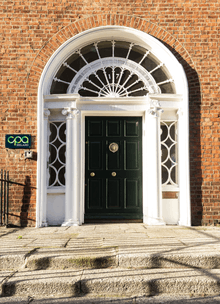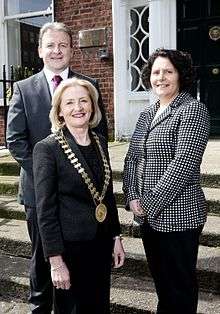Institute of Certified Public Accountants in Ireland
CPA Ireland, formerly the Institute of Certified Public Accountants in Ireland, is one of the main Irish accountancy bodies, with 5,000 members and students.[2]
| Abbreviation | CPA Ireland |
|---|---|
| Formation | 11 March 1926 |
| Legal status | Company limited by guarantee |
| Headquarters | Dublin, Ireland |
Region | Republic of Ireland and Northern Ireland |
Membership | c. 4,000[1] |
President | Gearoid O'Driscoll |
Students | c. 1,000 |
| Website | www |
The CPA designation is the most commonly used designation worldwide for professional accountants. One million qualified accountants worldwide are CPAs. CPA Ireland was founded in 1926 and its members work in accountancy firms, the public sector, the financial services, and other private sector businesses.
CPA Ireland is a member of the Consultative Committee of Accountancy Bodies – Ireland (CCAB – I), a founding member of the International Federation of Accountants (IFAC),[3] and a member of the Fédération des Experts Comptables Européens (FEE), the representative organisation for the profession in Europe.
CPA Ireland headquarters are based in Dublin
History of CPA Ireland
CPA Ireland was founded as the Irish Association of Accountants on 11 March 1926 and then went on to join with the Irish Society of Public Accountants, originally incorporated 29 January 1943. This amalgamation, in 1964, blended the two bodies to become the CPA Ireland we have today. The first CPA exams for election to membership were held in November 1926 and CPA Ireland today represents 5000 members and students.

In 1961 the Society of Public Accountants gained legal recognition and changed its name to The Irish Society of Certified Public Accountants Ltd; this was changed again in 1971 to The Institute of Certified Public Accountants in Ireland.
The institute was invited to join the Consultative Committee of Accountancy Bodies – Ireland in 1991.
CPA Ireland held merger discussions with the 20,000-member Institute of Chartered Accountants in Ireland in 2001 and again in 2003, but on both occasions the respective Councils of each body decided not to proceed to a vote of members on the issue.[4]
Council of the institute

The council of the institute is made up of 16 elected members and up to three non-members, including the president and vice presidents of the institute. The council meets approximately eight times a year to set policy on areas like the regulation of members in the public interest, the growth and development of the institute and examination and training standards.
The office-holders for 2019/2020 are:[5]
- Gearoid O'Driscoll (President)
- John Devaney (vice president)
- Aine Collins (Vice President)
Qualification
Students do not need a business or accountancy-related degree to become an accountant; CPA students include school-leavers, mature students and graduates. Previous qualifications may entitle students to exemptions.
Students can choose between two flexible study options, either online or part time study to complete the CPA Qualification, and can choose to Study with either Griffith College or Study Online for their studies.
There are four stages of examinations with the CPA Institute; Formation 1 and 2 and Professional 1 and 2. Students must complete three years of training to apply for membership of the CPA. Training can take place in practice, industry or both. Students may first study for the CPA exams and obtain the required training at a later date.
Practice
CPA Members who wish to engage in public practice must hold a practising certificate, which requires completion of a Practice Orientation Course and examination, and two years' experience in their intended practice area after admission to membership.
Audit
To be eligible to act as an auditor, CPA members must hold an audit certificate, requiring a practising certificate and an audit qualification. To obtain this, members must have three years' experience supervised by a registered auditor.
Role

As CPA Ireland is a recognised body, it has a statutory obligation to oversee the professional activities of its members in practice, ensuring that education and training standards are maintained.
"The role of the institute is to:
- regulate CPAs in accordance with the law and the institute's code of ethics in the public interest,
- ensure that CPAs are constantly up to date in all matters relating to their professional work,
- maintain the highest levels of educational standards for new entrants to the profession, and
- represent the interests of our members where appropriate."[6]
Mutual recognition

CPA Ireland members work in over 40 countries. CPA Ireland has mutual recognition agreements (MRAs) with CPA Australia,[7] ICA India,[8] ICA Bangladesh and CGA Canada,[9] South African Institute of Professional Accountants (SAIPA),[10] the Association of National Accountants of Nigeria (ANAN) and Institute of Cost and Management Accountants of Pakistan (ICMA Pakistan)
The institute also has memorandums of understanding (MOU) with CPA Sri Lanka, CPA Bulgaria, CPA Russia, CPA Belarus and The Chartered Institute of Management Accountants (CIMA) giving CPA Ireland Members preferential access to the Chartered Global Management Accountant (CGMA) designation.
CPA Ireland also has Memorandums of Understanding with CPA Rwanda, CPA Zimbabwe and the Lithuanian Chamber of Auditors and is recognised as an approved body of auditors in New Zealand.
World Bank contracts
In 2011, CPA Ireland was awarded two World Bank contracts worth $1.5 million to develop the accountancy profession in Rwanda and Mozambique.[1]
See also
References
- Ciaran Hancock (5 August 2011). "CPA Ireland wins contracts worth $1.5m in Africa". Irish Times. Retrieved 27 July 2012.
- "Numbers add up to top accountancy award". New Ross Standard. 10 January 2012. Retrieved 25 July 2012.
- Founding Members, IFAC
- Gavin Hinks (4 February 2004). "Irish institutes' merger called off". Accountancy Age. Retrieved 25 July 2012.
- Office-holders for 2019/2020
- "Institute home page". Archived from the original on 29 July 2012. Retrieved 25 July 2012.
- "CPA Ireland and CPA Australia Mutual Recognition Agreement".
- "CPA Ireland and ICAI MRA".
- "CPA and CGA-Canada Mutual Recognition Agreement".
- "CPA Announces Alliance with South African Body". Archived from the original on 17 February 2013. Retrieved 25 July 2012.